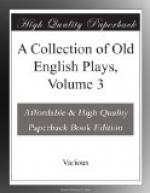[113] A common proverbial expression. The dish is the wooden “clap-dish” on which beggars clattered to attract attention.
[114] I should prefer “true heart his loyalty”—for the metre’s sake.
[115] 4to. staffe.
[116] 4to. strayne.
[117] 4to. his passions.
[118] “A corrupt oath, the origin of which is obscure and not worth inquiring.”—Nares.
[119] The author certainly had in his mind Falstaff’s puns on the names of the recruits, Mouldy, Shadow, &c. (ii. Henry IV. iii. 2).
[120] An extemporal play by the famous Richard Tarleton. The “plat” is preserved at Dulwich College. See Collier’s “Hist. of Dramatic Poetry,” iii. 394 (first edition).
[121] So the 4to, but I should prefer “So I have discharg’d myselfe of these hot-shots.” The term “hot-shot” seems to have been originally applied to sharp-shooters.
[122] i.e., maid: an East-Anglian usage of the word “mother.” See Forby’s “Vocabulary of East Anglia.” “Mauther” is the commoner form (found in Ben Jonson and others), but “mother” occurs in Chettle and Day’s Blind Beggar and elsewhere.
[123] I find this expression of feminine impatience in Dekker’s Honest Whore (Dramatic Works, ii. 26):—“Marry muffe, sir, are you growne so dainty!”
[124] Let me understand you. The expression is of constant occurrence.
[125] A term of contempt like “pilchard” and “poor John.” “Haberdine” was the name for an inferior kind of cod used for salting.
[126] So Pistol, “A foutre for the world, and worldlings base!” “A foutre for thine office!” ii. Henry IV. v. 3.
[127] Verjuice was made by pounding crab-apples.
[128] Kite.
[129] Dingy. “Russet” or “russeting” was the name of the coarse brown dress worn by shepherds.
[130] In Henry V., iv. 1, Pistol accosts the king with “Che vous la?” according to the first folio. Modern editors correct the intentional blunder.
[131] To “outface with a card of ten” was just what we mean by “browbeat.” The expression (which is very common) was no doubt drawn from the game of primero.
[132] Old spelling of “pumpkin.”
[133] The officer of lowest rank (now called “lance corporal").
[134] Quart d’ecu.
[135] Cf. Day’s Ile of Guls, ii. 2:—
“But forresters, like
images, set forth
The tyrannie of greatness
without pittie.”
Everybody remembers Jaques’ moralising in As You Like It, ii. 1.
[136] Cf. Day’s Humour out of Breath, I. 2:—“Deceive the watry subjects.”
[137] To “kill with kindness” was a proverbial saying.
[138] A falconer’s term: to flap the wings when preparing for flight.
[139] A giant who was conquered by Sir Bevis of Southampton. See notes of the commentators on 2 Henry VI., ii. 3: “Therefore, Peter, have at thee with a downright blow, as Bevis of Southampton fell upon Ascapart.”




